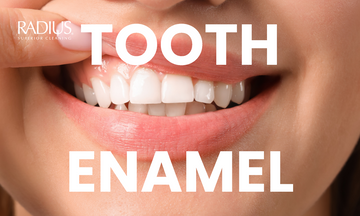At RADIUS, we believe that a healthy smile starts with strong protection — and at the very heart of that protection is your tooth enamel. As the outermost layer of your teeth, enamel plays a critical role in keeping your teeth strong, healthy, and resilient against everyday wear and tear. But despite its strength, enamel isn’t invincible. In fact, once it’s damaged, it can’t regenerate.
That’s why understanding how to naturally protect your enamel is key to lifelong oral health. Today, we’re taking a closer look at what enamel is, why it matters, and how simple choices — like choosing the right toothbrush and toothpaste — can help preserve it.
What Is Tooth Enamel?
Tooth enamel is the hardest substance in the human body, even stronger than bone. It’s made up mostly of minerals, primarily hydroxyapatite, which is a crystalline form of calcium phosphate. This mineral composition gives enamel its strength, but it also makes it susceptible to erosion from acids, physical abrasion, and poor oral care habits.
Your enamel protects the inner layers of your teeth — the dentin and pulp — from sensitivity, cavities, and damage. When enamel wears away, it leaves your teeth vulnerable to decay, pain, and cosmetic issues like discoloration.
Unlike other tissues in the body, enamel does not regenerate once it’s lost. That makes preventive care essential.
Why Is Enamel Erosion a Concern?
Many everyday factors can wear down enamel over time, including:
-
Acidic foods and beverages (like citrus fruits, sodas, and wine)
-
Aggressive brushing with hard-bristled toothbrushes
-
Dry mouth conditions that reduce protective saliva
-
Teeth grinding (bruxism)
-
Poor oral hygiene habits
-
Medical conditions like acid reflux
Once enamel erosion starts, you may notice:
-
Increased tooth sensitivity
-
Discoloration (as the underlying dentin shows through)
-
Rough or uneven tooth surfaces
-
Chips or cracks in teeth
The good news is, with the right tools and habits, you can help protect your enamel naturally.
How to Naturally Protect Your Tooth Enamel
1. Choose a Toothbrush Designed for Gentle Care
Brushing your teeth is crucial — but how you brush, and what you brush with, matters even more. Using a toothbrush that is too harsh can wear away enamel over time.
At RADIUS, we design our toothbrushes with enamel protection in mind. For example, our RADIUS Source™ Toothbrush features ultra-soft, vegetable-based bristles that gently clean without damaging the enamel. The bristle head is larger than conventional toothbrushes, allowing for a wider cleaning surface and a gentler brushing experience.
Our handles, made from upcycled natural materials are eco-friendly and ergonomically designed, offering better control so you can brush without applying excessive force. A lighter touch goes a long way in protecting your enamel!
Tip: Always choose soft or ultra-soft bristles and brush with gentle, circular motions to prevent abrasive wear on your enamel.
2. Use Toothpaste That Supports Enamel Health
Choosing a toothpaste that’s safe and nourishing for your teeth is another way to naturally protect enamel.
Using a toothpaste formulated with naturally gentle ingredients helps cleanse the teeth while supporting the overall health of the enamel surface.
Look for: Ingredients that soothe and clean naturally, like organic coconut oil and organic aloe vera, and avoid synthetic additives and intense abrasives.
3. Floss Daily to Prevent Plaque Buildup
Plaque doesn’t just threaten your gums — it can also contribute to enamel erosion. When plaque is not removed, it produces acids that attack the enamel and lead to cavities.
Our RADIUS Vegan Sponge Floss is an excellent tool for protecting your enamel. Made with organic coconut oil and organic erythritol, it gently glides between teeth, removing plaque and debris without fraying or damaging your gumline.
Unlike conventional flosses coated with synthetic wax, our Vegan Sponge Floss is spun with a soft, sponge-like texture, making it more effective at capturing and removing buildup.
Daily flossing tip: Be gentle when guiding floss between teeth to avoid damaging gums and enamel near the gumline.
4. Mind Your Diet
Foods and drinks have a big impact on enamel health. Limit acidic foods and beverages, and when you do indulge, rinse your mouth with water afterward. Eating foods rich in calcium and phosphorus, like leafy greens, almonds, and dairy, can also help maintain strong enamel.
Sugary foods feed harmful bacteria in your mouth, leading to acid production. Staying mindful of sugar intake is one of the easiest ways to protect your teeth naturally.
Pro tip: Chewing sugar-free gum after meals (especially those containing xylitol) can stimulate saliva production, helping to neutralize acids and protect enamel.
5. Stay Hydrated
Saliva is one of your body’s natural defenses against enamel erosion. It helps wash away food particles, neutralizes acids, and delivers minerals back to the enamel.
Drink plenty of water throughout the day, and be especially mindful to stay hydrated during hot weather, physical activity, or when taking medications that can dry out the mouth.
6. Schedule Regular Dental Checkups
Even with the best at-home care, seeing a dentist regularly is essential for protecting your enamel. Your dentist can spot early signs of enamel erosion, recommend treatments if needed, and guide you on additional preventive care steps.
Regular cleanings also help remove tartar (hardened plaque) that you can’t eliminate through brushing and flossing alone.
Protecting your enamel doesn’t have to be complicated. It starts with daily habits, conscious product choices, and a commitment to treating your mouth with the care it deserves.
Your enamel may be tough — but with the right support, it can stay strong and beautiful for life. And we’re honored to be a part of your journey toward a healthier, happier smile.

